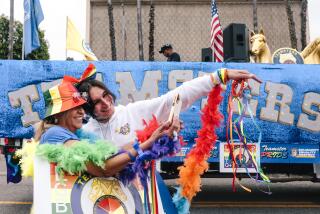UPDATE : Teamster Leader’s Mantle of Reform Starting to Fray : Elected on pledge to clean up union, Ron Carey is criticized for alleged Mafia links and being slow to attack corruption.
- Share via
WASHINGTON — When Ron Carey was elected president of the Teamsters in 1991, advocates of reform inside and outside the nation’s largest trade union breathed a sign of relief. Hailed as “Mr. Clean” after a series of scandal-tainted Teamster chiefs, three of whom went to federal prison, Carey pledged to rid his union of mob influence.
Now, midway through his first term, Carey is being dogged by allegations that his own rise to power has been stained by Mafia connections and that he has been slow to attack corruption.
Carey counters that political enemies, looking to the 1996 union vote, are trying to do him in through a smear campaign--seeking to discredit his reform efforts.
But the criticism comes from more than political enemies: His detractors have included some highly credentialed authorities--a Mafia turncoat for whom the FBI vouches, a nationally known former prosecutor and a veteran federal judge. The Justice Department is aware of the allegations and is examining them, an official said.
More than a dozen members of Congress have written the department to urge a thorough review. Rep. Don Edwards (D-San Jose), a ranking member of the House Judiciary Committee, has asked Atty. Gen. Janet Reno “to examine the material closely and look into the matter personally.”
According to FBI records, Alphonse (Little Al) D’Arco, a former organized crime bigwig who has become a protected government witness, has asserted that Carey earlier in his career honored illegal picket lines thrown up by the Lucchese crime family. Carey formerly headed New York Teamsters Local 804, whose members handle air freight.
D’Arco’s statements are contained in a confidential report prepared by two FBI agents on Jan. 7, 1992, soon after the mobster began to cooperate with the government.
Referring to D’Arco as “CW” (cooperating witness), the agents wrote: “When CW used to put up illegal pickets/strikes, CW would call Carey to advise him of same, and Carey would honor the strike without even investigating the nature, purpose or legitimacy of the strike.”
Carey claims he never has met or spoken with D’Arco. Yet critics point to circumstantial evidence that Carey has had other ties to the Lucchese syndicate.
Soon after Carey took office as president of the 1.4-million member union, Frederick B. Lacey--a former federal judge who helps oversee Teamster affairs--vetoed Carey’s appointment of veteran Teamster William F. Genoese as trustee of Local 295. Lacey said Genoese had “a sad record” of fighting corruption while representing cargo handlers at John F. Kennedy Airport and that he had lied under oath about his efforts to secure his appointment by Carey.
Lacey overruled the appointment on grounds that it “would further an act of racketeering activity” within the Teamsters. Federal investigators had linked Genoese to the Lucchese family.
Carey then withdrew the appointment, calling it a mistake.
U.S. District Judge Eugene H. Nickerson appointed Thomas Puccio, a respected ex-prosecutor, to replace Genoese as permanent trustee of Local 295, a scandal-scarred union whose past president was found to be a Mafia member.
And Puccio filed a brief in federal court last month that said Carey, as national president, also had been slow to attack corruption in a “sister local” of 295 controlled for years by the Lucchese family.
Puccio said Carey dragged his feet for months in replacing Anthony Razza as leader of Local 851. Razza subsequently pleaded guilty to corruption charges.
Carey’s critics also have dug up court records from a 1975 criminal case in New York showing that Carey appeared as a character witness for John Joseph Conti, who was identified as a “soldier” in the Lucchese crime family by the Senate permanent investigations subcommittee. Conti was later acquitted of charges that he extorted bribes from small businessmen.
Carey’s aides and supporters claim Puccio’s charges are politically motivated, that he is simply trying to extend his power as a court-appointed trustee over the second union, Local 851.
And Carey said in a statement that he has acted to place more than 30 Teamster locals in trusteeship because of financial malfeasance or other wrongdoing by local union officers.
But U.S. District Judge David Edelstein of New York, who exercises judicial supervision over the Teamsters, has said that the new union chief seemed to be ignoring his pledges of reform. Carey’s actions “presage toleration of organized crime’s influence in union affairs and complacency in the face of corruption,” the judge said.
Edelstein recently has been less critical and has upheld moves by Carey to abolish the mid-level layer of Teamster regional conferences across the country, and with it the conference officials who often draw high union salaries. Carey has said these leaders, who he claims are responsible for most of the personal “smears” against him, are not needed by the rank-and-file members.
As to the validity of the so-called smears of Carey, a three-member independent review board that works under Edelstein’s auspices reported this week that its inquiry “does not support our recommending charges against Carey.”
More to Read
Get the L.A. Times Politics newsletter
Deeply reported insights into legislation, politics and policy from Sacramento, Washington and beyond. In your inbox twice per week.
You may occasionally receive promotional content from the Los Angeles Times.








